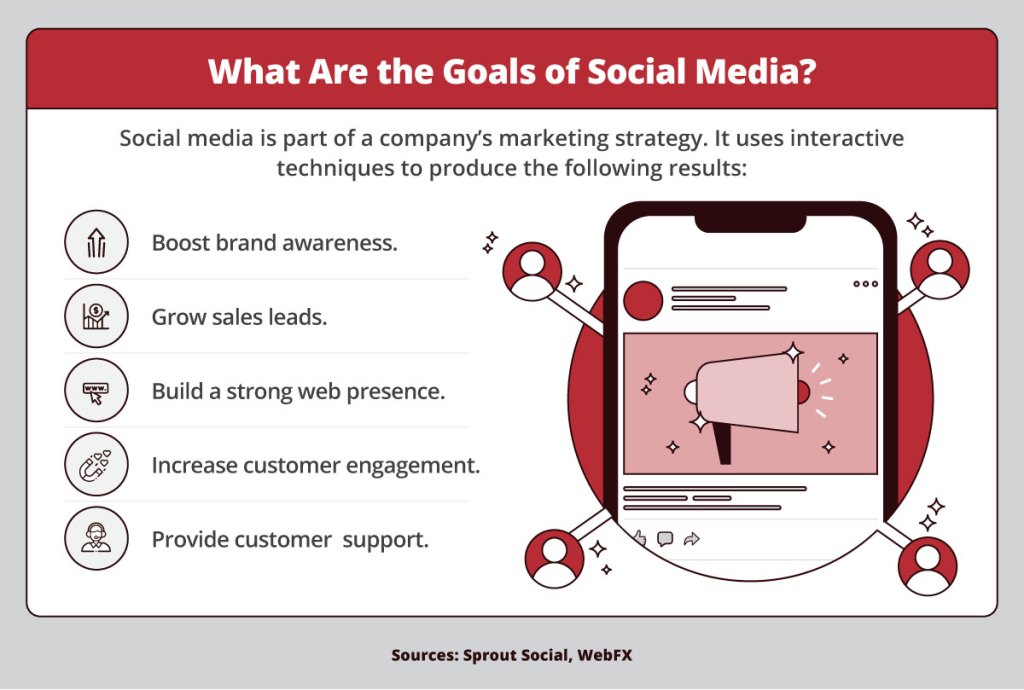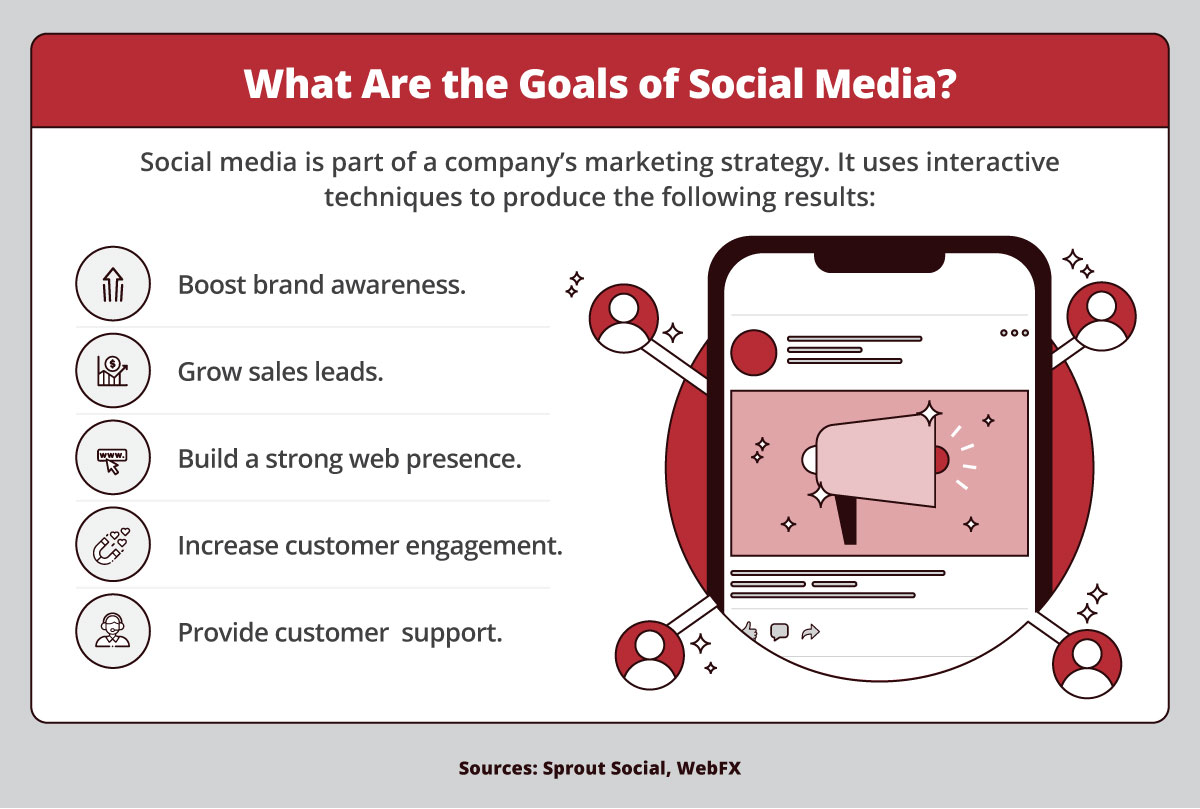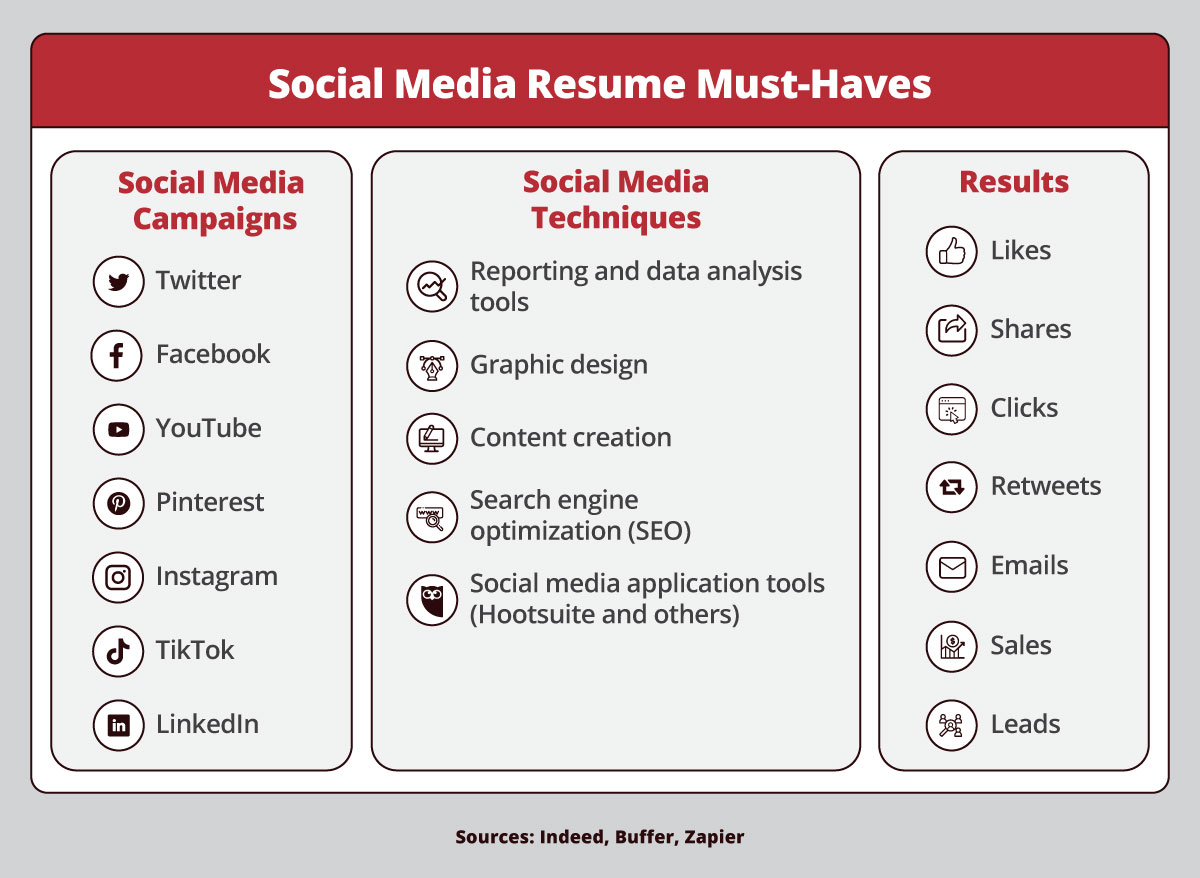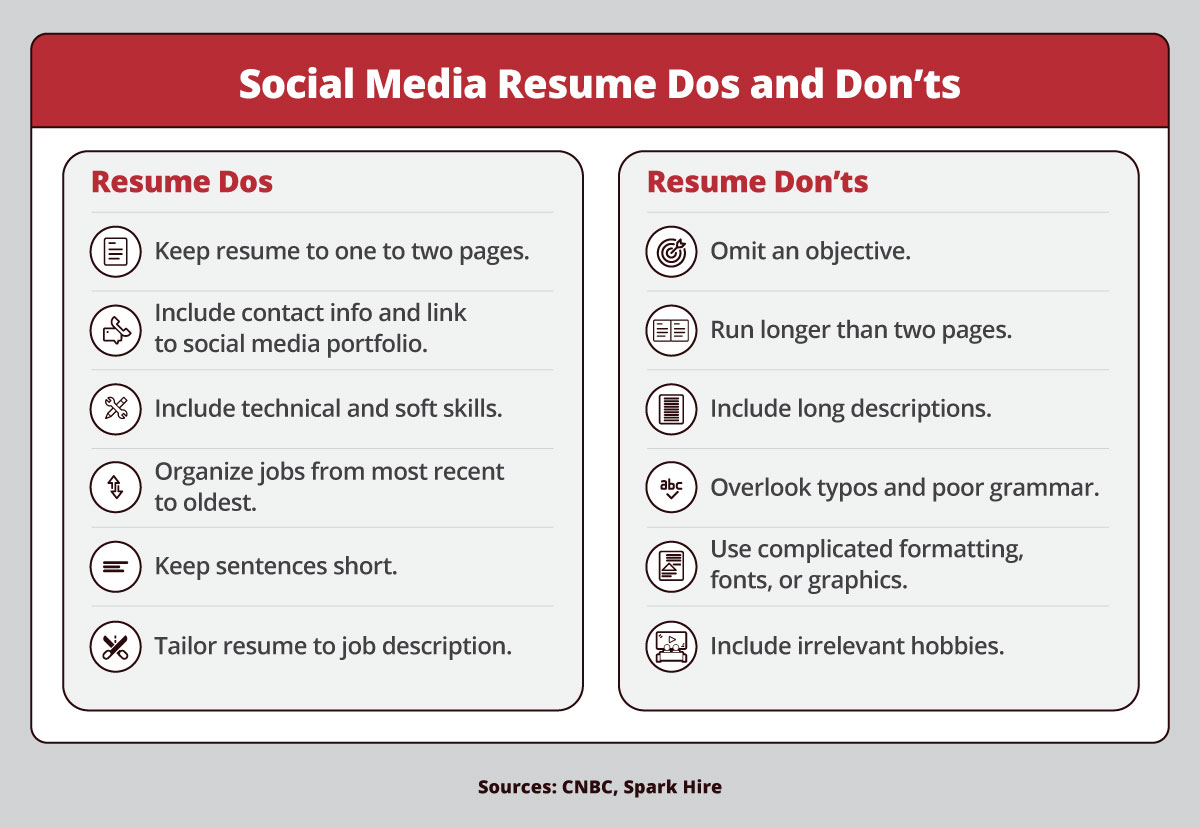Social Media Resume: Skills Employers Look For

Tables of Contents
- First Impressions: The Social Media Resume
- Your Social Media Resume Marketable Skills List
- How to List Social Media Skills on a Resume
- How to Improve Your Social Media Skills
- Make Your Social Media Resume Stand Out
Marketing professionals know how crucial social media is to brand and customer engagement, which in turn drives sales and profits. To be effective, social media campaigns have two goals: to create a conversation with customers about a company’s products and services, and to produce measurable results. A successful social media resume showcases a job candidate’s experience in planning and executing social media campaigns that meet these goals. However, even if a candidate has the right experience, a poorly prepared resume will be set aside.
Read on for tips on how to put together an effective social media resume.

Social media is part of a company’s marketing strategy. It uses interactive techniques to produce the following results, according to Sprout Social and WebFX: boost brand awareness, grow sales leads, increase customer engagement, provide customer support, and build a strong web presence.
First Impressions: The Social Media Resume
Hiring managers use resumes to review a job candidate’s work history, skills, and experience to determine whether the candidate fits their needs. All resumes must be concise, factual, and easy to read.
For social media roles, hiring managers look at a candidate’s work experience and skills in the context of their social media strategy. A social media resume should include the following information to attract the interest of the hiring team:
- Job history. A chronological job history should include the company name, dates of employment, title, and social media tasks and responsibilities. It includes project and people management, organizational responsibilities, and data analytics, where applicable.
- Content creation. Each job description should include the candidate’s experience with content (text, video, and images) creation, a key social media skill.
- Social media technology. Each job description should also include the technology and apps used in day-to-day responsibilities.
- Examples of campaigns and results give hiring managers an idea of a job candidate’s work and how effective it is.
Your Social Media Resume Marketable Skills List
Every career has what’s called a marketable skills list of the technical (hard) and soft skills that are essential for success in a particular field. Some skills are important for all professions; for example, good oral and written communication skills are generally considered to be an asset no matter where a person works.
Because social media is always changing, this marketable skills list doesn’t remain static. Existing platforms evolve and new platforms come online. It’s vital to continue to gain expertise and learn new techniques to stay ahead of the changing landscape.
The following are the most important skills for a career in social media that should be showcased on a resume:

Social media resumes should include experience with Twitter, Facebook, YouTube, Pinterest, Instagram, TikTok, and LinkedIn; show skill with reporting and data analysis tools, graphic design, content creation, search engine optimization (SEO), and social media application tools (Hootsuite and others); and highlight results that your campaigns have achieved in the form of likes, shares, clicks, retweets, emails, sales, and leads, according to Indeed, Buffer, and Zapier.
Social Media Technical Skills
Social media professionals are content creators. This content is disseminated according to a set social media strategy to websites and social media platforms, as well as through email and other direct messaging applications. The following are the technical skills that are part of the social media tool kit.
HTML Coding
Web developers mainly perform coding. However, a social media professional may need some HTML skills to ensure written and visual content are properly formatted. This could be as simple as understanding how to insert links, create bullet points, and format images with alt text. It also might require more complex code, such as Cascading Style Sheets (CSS) tables. Coding skills should be part of the technology skills section of a resume.
Graphic Design
While graphic design professionals create the visually striking websites and newsletters that reach customers, social media experts can benefit from understanding the basics of graphic design. They can use this knowledge to work with designers and explain what they need and how best to create it. In a pinch, they might be able to create designs that work for what they need, especially with off-the-cuff posts on image-heavy sites such as Instagram and Snapchat.
Writing, Editing, and Proofreading
Written content is at the heart of social media campaigns. Companies engage with customers and potential customers using web content; posts and tweets on various platforms; email and newsletter campaigns; and text messages. Content must be clear, on-brand, well-written, and error-free. Social media professionals need to be excellent writers. They also need to be able to edit and proofread their own work and that of others.
Images, Video, and Audio
Images, video, and audio add pizzazz to a social media marketing campaign, but if used indiscriminately, they can result in a poor user experience. Social media professionals know they need to account for how such content will be viewed or downloaded. They understand how to optimize video for phone, tablet, or desktop; whether images should be landscape or portrait; file size; and other factors. Platforms such as YouTube have file formatting specifications for uploading files to ensure video displays at its best.
Search Engine Optimization
What are customers searching for? Do your products and services come up in these searches? Most important, do they appear at the top of the search engine results page (SERP)? Social media professionals should have some background in search engine optimization (SEO). The best content in the world won’t bring in customers if they can’t find it. Marketing experts structure social media campaigns around keywords and phrases that their customers and potential customers have searched. Social media professionals who know SEO can use this technology to craft effective campaigns that engage with customers and potential customers.
Social Media Tools
How hard can social media be — it’s just tweeting, right? Social media experts know that effective social media is a lot more than just posting and tweeting. These professionals use tools that help them execute a marketing campaign with a combination of applications. For example, Hootsuite facilitates posting across platforms and compiles the results. Email newsletter tools such as Mailchimp and engagement tools such as SurveyMonkey allow companies to reach out to new and existing users and engage them in a conversation or other interaction.
Data Analytics
To be effective, social media marketing campaigns need to be creative, engaging, and emotionally satisfying. They also need to be measurable. Social media experts need experience with data analytics tools. These tools allow marketers to understand the impact of a social media campaign by providing insights into consumer reactions. Did a user like or retweet a post? How did a customer respond to a text or an email? Was social media effective in rekindling a relationship with former customers? All this data is essential to understand how well social media is working for a company.
Social Media Soft Skills
Soft skills put the “social” in social media. These skills highlight the goal of social media marketing: to engage with customers and potential customers. They show that a job candidate can open up a conversation with an audience.
Some of the soft skills that hiring managers look for are as follows:
Creativity
Creativity is the driving force of effective social media, but it goes beyond great writing and compelling visual imagery. Social media experts use their creativity throughout the process of designing and executing a campaign. They’re creative in how they engage with their audience or solve a customer’s problem. No one-size-fits-all approach exists with social media, and being a creative problem-solver is a highly desired skill for social media experts.
Communication
Effective communication skills are a must-have for social media professionals. Besides being able to create campaigns that use social media platforms to engage with customers, professionals need to have:
- Presentation skills. Project presentations, including campaign results, are a large part of their job responsibilities.
- Client and vendor communication skills. Social media experts must convey project scope to in-house and other clients. They must be able to explain deliverables and deadlines to vendors and others.
- Manager and executive communication skills. Social media managers and others need to be able to explain the project status, goals, and results to managers and executives.
Organizational Skills
Project management is a key skill for social media experts. Scheduling, including project deadlines and publication dates; workflow management; deliverables; and the nuts and bolts of campaigns fall in this category. The combination of creativity and excellent organizational skills is a desirable attribute for social media professionals.
Customer Care
A social media expert may be the first person a disgruntled customer reaches out to, which is why customer care is a huge part of the job description. Understanding what customers need, helping solve their problems, and following up are critical job skills. Providing examples of customer care on a social media resume can be an effective illustration of how a job candidate understands social media’s goal and the part it plays in a company’s marketing strategy.
Brand Engagement
Companies can have a Facebook page, a Twitter feed, and a LinkedIn presence and still have no brand engagement: It’s all one way. Think of brand engagement as a conversation. Make sure that customer feedback gets a response. Some brands, especially retail or lifestyle brands, can share stories that have nothing to do with a company’s product or service, but everything to do with their customer base. Maybe that means tweeting about pets or asking customers about their favorite ice cream. Just like conversations in real life, carrying on a social media conversation is as much an art as a science.
How to List Social Media Skills on a Resume
After identifying what social media marketable skills are, be sure to highlight them on your resume. Remember, the goal of the resume is to provide a hiring manager with an overview of your applicable experience for the job. Resumes should be concise, easy to read, and error-free.
Most companies use an applicant tracking system (ATS) to manage the application process. The ATS scans resumes for job keywords. Some systems may reject an application that doesn’t have the specific skills a company is looking for. A successful social media resume has to get past this first hurdle before a candidate can get an interview.

Resume dos: keep resume to one to two pages; include contact info and link to social media portfolio; include technical and soft skills; organize jobs from most recent to oldest; keep sentences short; and tailor your resume to the job description, according to CNBC and Spark Hire. Resume don’ts: omit an objective; run longer than two pages; include long descriptions; overlook typos and poor grammar; use complicated formatting, fonts, or graphics; or include irrelevant hobbies.
Elements of a Social Media Resume
Following best practices for resume elements will help a candidate’s job history and experience stand out.
- Job-specific resumes. Ideally, you should tailor your resume to each job. While it’s more work, it helps in writing a resume that uses the same keywords as the job profile. This will make it easier for the ATS to flag your resume for the hiring manager.
- Resume structure and format. Build your resume in reverse chronological order (current or most recent job first). Use clean formatting (one font, with subheadings in bold). List marketable skills in a skills section at the top.
- Highlighted projects and achievements. Each job section should include examples of social media campaigns, your role, and results. Explain what skills you used to achieve or help achieve these results.
- Resumes shouldn’t be longer than two pages. Focus only on your social media skills and experience. Don’t include hobbies, unless applicable to social media. Let your experience speak for itself.
Additional Application Materials
In a crowded field, how does a job candidate stand out? Companies that value social media expertise may be open to creative applications. “Marketing and communication departments can find young talent the same way they monitor their current industry, social listening,” Maryville University Associate Professor of Communications Dustin York says in Forbes. “Genuinely listen to users’ content and ask yourself, ‘Does this match with our organization’s mission and goals?’”
Besides the resume, social media professionals should include additional materials in their applications.
- Cover letter. A cover letter doesn’t just recap your experience. You can use it to provide additional insight into some aspect of your work history. You can tell hiring managers what you learned or how you solved a specific problem, for example.
- Portfolio website. Showcase skills with a portfolio website. This is an efficient way for hiring managers to browse your work and see what you bring to the table.
- Video resume. A video resume won’t replace a traditional resume right away, but it can be a fun way to highlight a candidate’s ability to create engaging content. “Although TikTok resumes make up a small piece of that future, they can indeed tell the quick, digital story of an applicant — think of it as a visual elevator pitch,” York says.
How to Improve Your Social Media Skills
How do you know it’s time to improve your social media skills? Maybe your campaigns have had lackluster results. Perhaps your company has dropped off the first page of the search results, or a social media program has resulted in negative engagement. If so, it’s time to revitalize your social media skills.
After all, social media doesn’t stay still. Platforms and technologies change at a dizzying rate. Social media professionals know that to stay at the top of their profession, they need to learn and grow daily. Some tips for improving social media skills are as follows:
- Engage in self-directed learning. Some social media experts find that the best way to learn is by doing. They explore tools and platforms on their own and create test campaigns.
- Stay abreast of trends. Keep up with what’s happening using social media tools and industry websites. Apply what you’ve learned by testing new content or techniques.
- Take digital marketing courses. Short-term courses, called boot camps, can be an effective way to update social media skills.
Make Your Social Media Resume Stand Out
You’re a social media expert. You have experience in developing and executing social media campaigns that have increased customer engagement. You’re a creative problem-solver who loves to help customers, promote your company’s brand, and boost your company’s search engine page rankings. Most important, you have the data analytics to prove it.
Showcase those hard-won skills by crafting a resume that gets you your dream job. A well-written and well-organized social media resume is the first step in advancing your career. Before you submit a job application, review this checklist to make sure you’ve incorporated everything you’ve learned. Make sure that your resume has the following attributes:
- Make sure your resume is clear, concise, and organized, with clear contact information.
- Marketable skills list. Include your social media, technology, and digital marketing experience.
- Tailor the resume to a specific job posting to match ATS keywords.
- Highlight your projects and results.
Also, you should double-check that your application package is complete:
- Cover letter. Include an additional example of a specific project that connects with the mission of the prospective employer.
- Portfolio website. Showcase your work with a portfolio website to highlight your graphic design skills.
- Video resume. Consider a video resume to round out your traditional resume.
- Social media presence. Include your own social media presence.
With an application that emphasizes your skills and talents, you may find that the ideal social media job is just around the corner.
Infographic Sources
Buffer, “How to Create a Social Media Report and Explain It to Your Boss or Client”
Indeed, “Social Media Skills: Definition and Examples”
SparkHire, “7 Signs Of Bad Resumes That You Need To Look Out For”
Sprout Social, “How to set (and achieve) meaningful social media goals”
Webfx, “6 Social Media Goals that Drive the Results You Desire”

